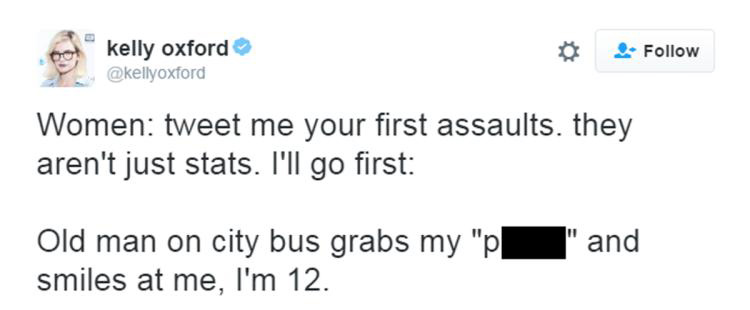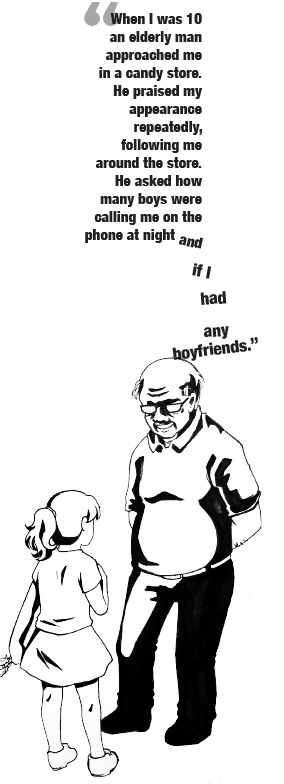Opinion: I’m Someone – Cutting through the ‘locker room talk’
When audio of President-Elect Donald Trump boasting about groping women without their permission was made public, numerous Republicans immediately began denouncing Trump. Many politicians weighed in their thoughts that because they had mothers, wives and daughters, Trump’s statements about women were misogynistic and inexcusable.
Though their statements may have been well intentioned, a woman is first and foremost a human being regardless of her relationship to a man. A woman should not have to be referred to as a man’s sister, mother, or daughter in order to be respected.
The problem with statements such as Senator Mitch McConnell’s, “As the father of three daughters, I strongly believe that Trump needs to apologize,” is that it is suggesting you shouldn’t abuse a woman because it would hurt her father, husband or son instead of focusing on the person actually being harmed.
The discussion is somehow still focused on men, giving their feelings and thoughts priority in a conversation that should include women and be about how to prevent sexual assault on women.

Author Kelly Oxford took to Twitter after Trump’s controversial video surfaced. Oxford started the hashtag #notokay for women to share stories of sexual assault.
It is no secret that men are also sexually assaulted, some have recently come forward under twitter hashtag #notokay to share their experiences of being assaulted or how rape culture has affected their lives.
The hashtag was initiated by New York Times bestselling author Kelly Oxford. She encouraged women to share their own experiences with rape culture and assault in response to Donald Trump’s self-proclaimed “locker room talk” with Billy Bush.
Since the Oct. 7 post, more than 9.7 million people have contributed to the conversation on sexual abuse via the trending hashtag.
Oxford started it all by sharing her personal experience, so to follow her example, I will tell a few of mine.
When I was in high school a male friend would not let me physically leave until I had kissed him on the face. He grabbed my shoulders and held me in place, angry that I did not reciprocate his feelings and did not want to kiss him. In that moment I realized just how easily he could overpower me.
When I was 10 an elderly man approached me in a candy store. He praised my appearance repeatedly, following me around the store. He asked how many boys were calling me on the phone at night and if I had any boyfriends.
When I was an infant, lying naked on a table awaiting a shot, the doctor squeezed my bottom and told my mother, “The boys are going to love this butt when she gets older.” Shocked and in disbelief of what she had heard, she asked him to repeat himself, and he did so without the slightest show of shame.
I have literally been dealing with disturbing comments and intimidating actions since before I can remember, but the pathetic reality is that I am fortunate. My friends have experienced worse. My mother has experienced worse.
As of 1998, an estimated total of 17.7 million American women and girls had been victims of attempted or completed rape. That means at least one female out of six has been the victim of sexual abuse. Millions of women and children have had to endure more violent assaults and/or more frequent instances of sexual assaults than I have.
We are told this is normal male behavior, just locker room talk, it’s what men laugh about and swap stories about.
It is not just talk. Women experience rape culture anywhere and everywhere.
Just because this attitude is common does not make it okay, it’s not okay.
In high school locker rooms these conversations are common. These boys vary in age from 13 (barely started puberty) to 18 (legal adults). At what age does the “boys-will-be-boys” excuse stop?
My sixteen year old brother, Ethan Hermosillo, was shocked when he first heard the lewd boastings from his classmates as they changed after P.E., he hadn’t heard vulgarities like that from the men in our family.
He sometimes comes to me with questions about things either not taught or poorly covered in his health class. Questions like, “What other types of birth control are there besides condoms and the pill?” or “Can girls get pregnant on their period?” and even “Does chocolate really help with periods?” He brings his girlfriend a chocolate bar every now and then.
Our family has no shame on the topic of sex, we encourage thought-provoking discussions about sexual safety, physiology, and orientations. To see my own brother upset by something other boys had said told me those remarks must have been demeaning and vulgar.
“It was really embarrassing,” he said, “They are so loud about it too, I don’t want to hear that stuff. They even talk that way about the female teachers.”
While this problem is bigger than Trump, he has participated in rape culture by admitting publicly that he has forced himself on women because he felt his status as a “successful businessman” and celebrity gave him the right to do whatever he wanted.
Trump released a tweet that said he was apologizing for what he said, not for what he did.
His so called apologies are riddled with excuses, distractions, and techniques often used by abusers, such as gaslighting.
“Anyone who knows me, know these words don’t reflect who I am,” Trump said via Twitter, a statement so contradictory that it becomes the reader’s responsibility to decide what to believe.
That is what’s known as gaslighting, a psychological tactic used by abusers to confuse their victims. He lies with such confidence that it causes others to doubt their original thoughts and opinions.
This means he doesn’t have to fact-check himself or be consistent. He waits for others to jump to his defense or to prove him wrong, in which case he can confidently lie again, leaving his audience second-guessing what is true and what isn’t.
As horrible as Trump’s actions and words have been, the silver lining is that his infamous behavior has brought rape culture into the realm of public discourse.
Millions are speaking out, and the conversation is ongoing. One hashtag at a time can– hopefully– one day drown out the locker room talk.



